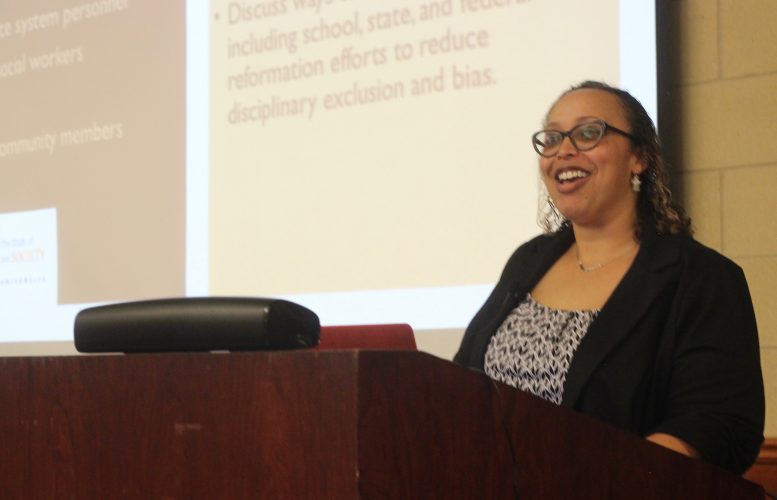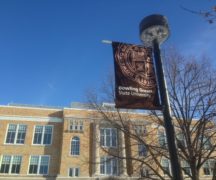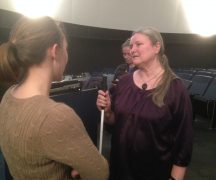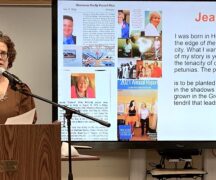By DAVID DUPONT
BG Independent News
For far too many students school leads to a prison cell, rather than a college classroom or job site.
Disciplinary policies intended to make schools safer are the cause, said Professor Starr Keyes, who teaches in the School of Counseling and Special Education at BGSU. A disproportionate number of those affected are black students, especially males, but also females, she said, in a recent talk on Disability, Race, and the School-to-Prison Pipeline.
The presentation, given in the lobby of the Bowling Green Performing Arts Center, was based on research she conducted during a fellowship with the university’s Institute for the Study of Culture & Society.
Keyes said that nationally 3.4 million students are suspended every year, with 1.43 million suspended more than twice. More than 130,000 are expelled. Black boys are three times more likely to be suspended, and though they represent 16 percent of student enrollment nationally, they account for 31 percent of the school related arrests.
Keyes’ research shows those disparities are just as evident in Northwest Ohio as in the rest of the country.
Any discussion so centered on race, she said, can make some people uncomfortable. “We need to keep students in focus. How will this conversation help and support our students?”
At the root of this dynamic are systemic inequities — racial disparities, segregated education, concentrated poverty, and discrepancies in how police enforced the law.
Out of school suspensions and expulsions “push students out of school and into the criminal justice system,” she said. This discipline is often “harsh and automatic for minor infractions, and disproportionally affects racial minorities and students in poverty.”
Those with disabilities, who are also more likely to be students of color, are also more impacted.
Zero tolerance policies took hold in the 1990s as a way to keep weapons out of school and crack down on school violence
They were meant to keep schools safe.
Those policies, Keyes said, “ended up being adopted for general disciplinary issues without regard to the seriousness of the infraction.”
That also meant bringing more police to patrol the hallways as school resource officers. That led to more arrests.
Almost three-quarters of the offenses that now lead to suspensions in Northwest Ohio are for disobedience and disruptive behavior, which are subjective, rather than objectively wrong like fighting, which represents about 10 percent of the suspensions.
And while this kind of discipline is most prevalent in middle and high school, such practices are becoming spreading downward, even into pre-kindergarten, she said. Now people are talking about the cradle to prison pipeline.
This kind of harsh discipline has life-long effects. Suspensions result in students getting lower grades and dropping out, or as one student quoted by Keyes put it: “Pushed out.”
These students are more likely to get involved in the criminal justice system. Having a criminal record makes it harder for them to get further education, and to get a job, and even find a place to live.
This “reinforces stereotypes of criminality of black males,” Keyes said.
Black students, Keyes said, feel like they are singled out by teachers.
That was reenforced during the question and answer session.
Tammy Robinson, who works in the cafeteria of a Toledo public school related a confrontation she had with a teacher who said they were wasting their time trying to teach these students he said were “animals.”
Robinson told him he had no business in the school.
Some students actually misbehave, Keyes said, so they can be sent to alternative programs where they believe they get more attention.
But there’s a lack of communication between schools and these alternative programs or the classes offered in juvenile detention centers.
All this is a civil rights issue, Keyes said Students have a right to an education. And they should be able to get that education in their neighborhood public school. The quality of education should not be determined by where they live or how much money they make.
Coming from a single-parent household, she talked about how her mother worked two jobs to be able to send her and her brother to private school.
The school to prison pipeline, Keyes said, needs to be “demolished.”
This can be done by intensive and on-going teacher training to help them understand the social and cultural dynamics involved as well as to make them aware of their own attitudes and biases. “How does my cultural background inform how I teach?”
She does this kind of self-reflection exercise with BGSU students, who report it is their favorite class during the course.
Schools need to have more support staff, counselors and nurses, in the school. Teachers need more respect and must be supported.
They should have disciplinary options other than “kicking students out.”
Teachers need to let students know they care about them. “And it has be genuine.”
For their part, teachers need to continually monitor students progress and keep them on task, Keyes said. They should create a community of learners by using peer tutoring and cooperative learning.
“We need to make sure we’re teaching behavioral expectations,” Keyes said. “Teach them how to problem solve.”
A more cooperative relationship with the criminal justice system also helps. Keyes said one judge finally got fed up with the number of course referrals for minor disruption and truancy, and refused to take those cases.
In California when a new approach was taken, not only did the number of suspensions drop dramatically, but test scores went up.
Bringing more African-Americans into teaching is also essential. BGSU, she said, is beginning to work on a project to recruit more black education students.
The school to prison pipeline is a complex and multifaceted problem. “We want to make sure we tackle it at all levels,” Keyes said. “We really need to tackle it all levels.”
That will take people working together. “Unity is the only plausible pathway to justice.”





